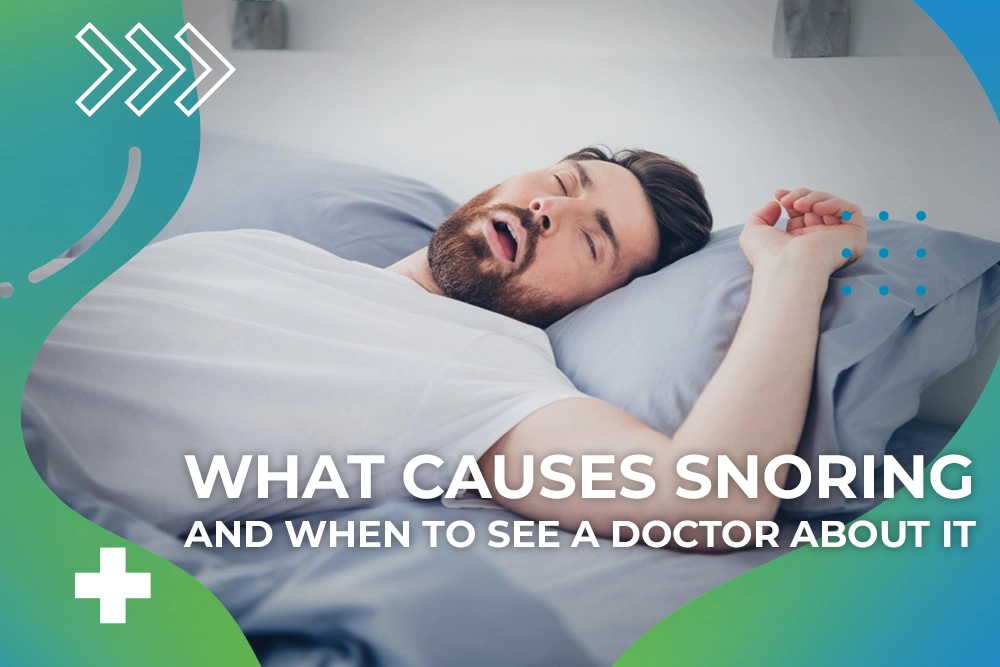Snoring is one of those things we often laugh about until it becomes a real problem. Maybe your partner snores so loudly that you can’t sleep. Or maybe you’ve been told you snore like a freight train but never realized it yourself. While snoring may seem harmless, it’s not always just a nighttime nuisance. Sometimes, it’s a sign of something more serious happening inside the body.
What Is Snoring, Really?
Snoring results from partial airway obstruction during sleep through your nose and mouth. The airway obstruction causes vibration of tissues around it, and the vibration produces that all-too-familiar rattling or buzzing noise.
It may occur on rare occasions, such as after a late-night party or when one is truly tired. But for others, it’s an every-night affair.
Why Do People Snore?
Good question and the response can be different from individual to individual. Let’s see some of the common reasons:
1. Blocked Nasal Passages
If your nose is congested from allergies, a cold, or sinusitis, it is harder to breathe. You snore more during these periods because your body is pushing air through a narrower tube.
2. Sleeping Position
More back sleepers snore. Why? Gravity pulls on the soft palate and the tongue, drawing them toward the back, which narrows the airway and makes vibrations more probable.
3. Obesity
Extra fat, particularly around the neck, can constrict the airways. By constricting the airway passage, this causes snoring.
4. Drinking Alcohol or Sedatives Before Bed
Alcohol relaxes the muscles of the throat. This can make it easier for your airway to partially close and cause snoring.
5. Age
As we get older, the throat becomes narrower, and the muscle tone in the throat decreases. This makes snoring more likely over time.
6. Structural Issues
Some people are just built in a way that makes them more likely to snore. A deviated septum (a crooked nose), enlarged tonsils, or a naturally narrow airway can all increase the risk.
The Serious Side: Sleep Apnea
Sometimes, snoring is more than just noise. If it’s accompanied by choking, gasping, or long pauses in breathing, it might be a sign of sleep apnea.
What Is Sleep Apnea?
Sleep apnea is a serious sleep disorder in which breathing repeatedly stops and starts during the night. People with sleep apnea often wake up feeling tired, even after a full night’s rest. Over time, this condition can lead to:
- High blood pressure
- Heart disease
- Type 2 diabetes
- Mood disorders
- Memory and focus problems
There are two main types of sleep apnea:
- Obstructive sleep apnea (OSA) – the more common type, caused by airway blockage
- Central sleep apnea – where the brain fails to send proper signals to muscles that control breathing
Snoring is one of the key symptoms of obstructive sleep apnea, especially if it’s loud and followed by silent pauses or choking.
When Should You See a Doctor?
Snoring isn’t always dangerous, but it can be a warning sign. You should talk to your doctor if:
- You snore loudly and frequently
- Your partner notices you stop breathing during sleep
- You wake up choking or gasping for air
- You always feel tired, even after 7–8 hours of sleep
- You have morning headaches or dry mouth
- You fall asleep easily during the day (even while working or driving)
A doctor might recommend a sleep study, where your breathing, heart rate, oxygen levels, and movements are monitored overnight. This helps determine if you have sleep apnea or another sleep disorder.
Treatment for Snoring
The good news is there are several ways to deal with snoring. The right treatment depends on what’s causing it.
1. Lifestyle Changes
Simple changes can make a big difference:
- Lose weight: Even a small reduction in weight can open up your airway.
- Change your sleeping position: Try sleeping on your side instead of your back.
- Avoid alcohol before bed: Stop drinking at least 3–4 hours before sleeping.
- Stick to a sleep schedule: Going to bed and waking up at the same time every day helps.
2. Nasal Treatments
If snoring is due to blocked nasal passages:
- Use saline sprays or decongestants.
- Treat allergies with antihistamines.
- Consider nasal strips or external dilators that stick to the nose.
3. Mouthpieces or Oral Devices
Dentists can provide custom-fitted devices that help keep your jaw or tongue in a position that maintains airflow.
4. CPAP Machines
If you’re diagnosed with sleep apnea, your doctor may prescribe a CPAP (Continuous Positive Airway Pressure) machine. It delivers a constant stream of air through a mask, keeping your airways open all night.
5. Surgical Options
In rare cases, surgery might be needed to remove or tighten tissues in the throat or to fix structural issues like a deviated septum.
Can Medication Help?
There’s no magic pill that cures snoring, but in some cases, addressing the underlying cause can help. For instance, if your snoring is related to poor sleep quality or daytime sleepiness, your doctor might recommend a wakefulness aid like Modaheal 200 mg.
This is sometimes used in people with sleep disorders like narcolepsy or shift work sleep disorder to help them stay alert during the day. However, Modaheal 200 mg is not a treatment for snoring itself and should only be used under medical guidance.
The Emotional Toll of Snoring
We often don’t talk about how snoring affects relationships. Couples can end up sleeping in separate rooms, or one partner might suffer from lack of sleep. If you or your partner snores, it’s important to approach the topic with care, not blame.
Remember: snoring isn’t a choice, it’s a symptom.
Preventing Snoring: Everyday Tips
While treatment options exist, prevention is always better. Here are a few day-to-day tips that may help reduce snoring:
- Hydrate: Dry throat tissues are more likely to vibrate.
- Keep the bedroom air moist: Use a humidifier if your room is dry.
- Elevate your head: Use an extra pillow or a wedge to raise your head.
- Exercise: It tones muscles throughout the body, including the throat.
- Practice throat exercises: Certain exercises may strengthen muscles in the upper airway, reducing snoring over time.
Final Thoughts
Snoring is no laughing matter or nightly bad habit, it’s probably a sign that there is something serious occurring in your body. It’s okay to snore every now and then, but repeat and heavy snoring must not be taken lightly, particularly if it is accompanied by nighttime tiredness or gasping.
Learning what makes you snore, why you snore, and the proper treatment of snoring will not only enhance your sleep but also your relationships, attitude, and health.
If you’re unsure whether your snoring is harmless or not, then it’s better to consult a doctor. Proper diagnosis will guide you towards solutions that allow you and your partner to sleep peacefully.
Frequently Asked Questions
1. Is snoring always a sign of a serious health problem?
No, not exactly. Snoring isn’t bad and could simply be a result of sleeping on your back, being fatigued, or being cold. But if it occurs frequently or is extremely loud, it could be a symptom of something more serious such as sleep apnea. If you’re feeling fatigued during the day or experience a breathing stoppage during sleep, you need to visit a physician.
2. Can losing weight really help reduce snoring?
Yes. Even a modest weight loss could decrease snoring. Snoring is caused by extra neck fat that constricts air passages, which is more difficult to breathe through when you’re asleep. This could lead to vibrations in the throat that produce snoring.
3. Does sleeping on your side help with snoring?
Yes. When sleeping on your back, your tongue and soft palate can fall back into the airway and obstruct air, causing snoring. When sleeping on your side, your airway remains more open and can cut down on or even stop snoring in most individuals.
4. When should I see a doctor about snoring?
You should see a doctor if:
- Your snoring is very loud and occurs most nights
- You choke or gasp upon waking up
- Your spouse observes lengthened pauses in your breathing
- You are constantly fatigued even after sleeping all night
They can be a sign of a disorder like sleep apnea.
5. Can Modaheal 200 mg stop snoring?
No, Modaheal 200 mg does not cure snoring. It’s a wakefulness-promoting medication used occasionally to treat sleep disorders such as narcolepsy. If snoring stems from poor quality sleep or excessive daytime sleepiness, your doctor may mention it as part of a larger treatment plan but will not correct the snoring.










Leave a Reply